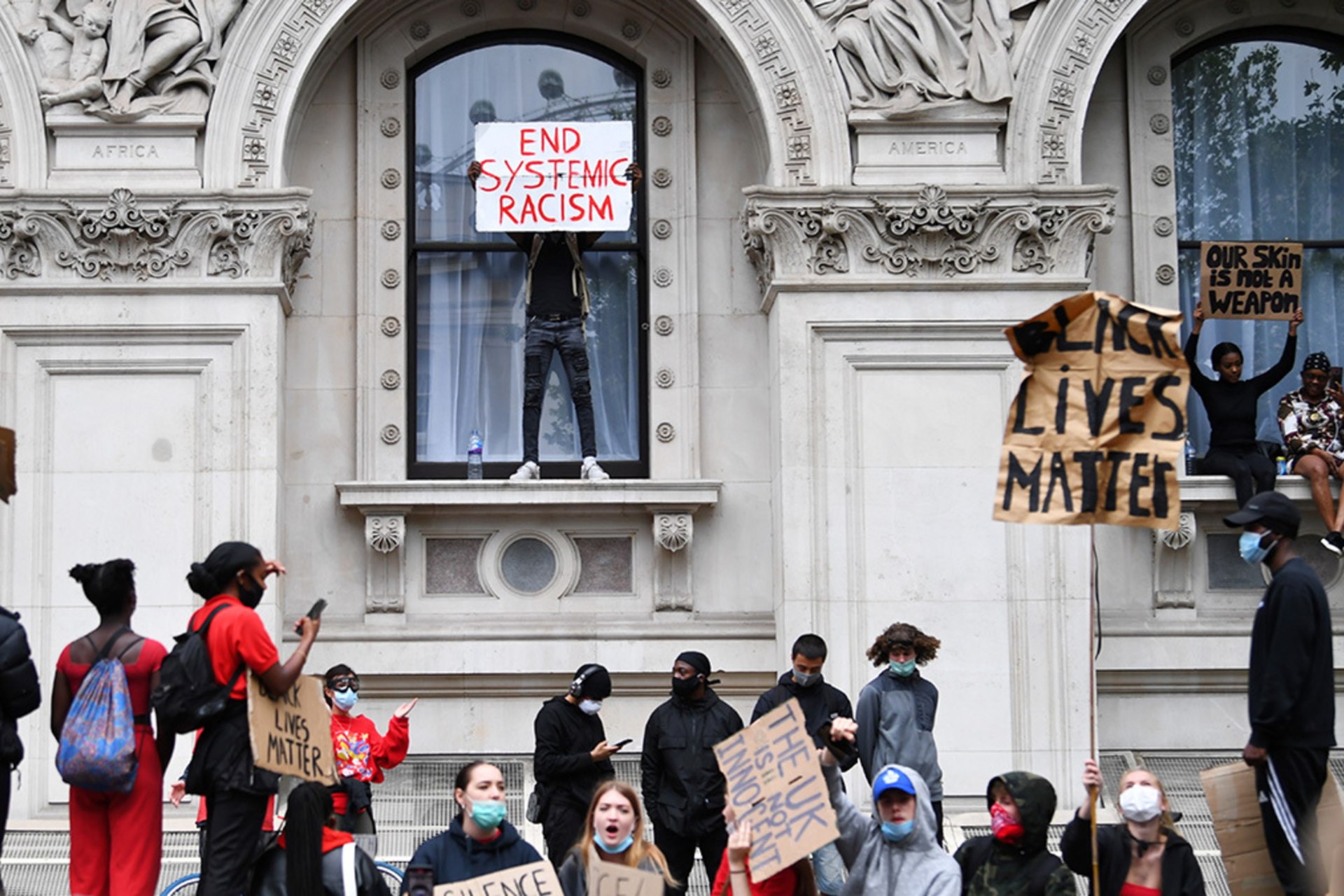How America’s Credibility Gap Hurts the Defense of Rights Abroad
The U.S. government’s response to anti-racism protests risks causing lasting damage to American credibility and influence in protecting minorities and oppressed groups worldwide.

“America the irrelevant.” That is the message the United States risks conveying in the wake of the coronavirus pandemic, economic collapse, and racism dominating 2020. Even before these recent events, Washington was hardly the beacon of stellar governance. But it is fresh incidents of racism, a problem in American society for hundreds of years, that could irreparably harm U.S. credibility to defend fundamental rights abroad.
Slavery and its evil twin, racism, define the past and the present in the United States. Americans struggled to evolve beyond these two legacies, even as adoption of the Reconstruction amendments to the U.S. constitution and a powerful civil rights movement led to legal reform and moral uplifting since the 1950s. Along the way, Jim Crow laws set the stage for racist policies; and segregation, discrimination, mass incarceration, and police brutality have daily violated the bedrock principle that “all men [humanity] are created equal.”
Footage showing the death of George Floyd in the custody of Minneapolis police on Memorial Day could ultimately transform the country, provided that peaceful protests, police reform, legislative initiatives, and principled leadership take hold. But for now, circumstances surrounding Floyd’s death deny the United States the moral high ground.
A Noncredible Actor
The racism America struggles with has echoes abroad, not only in racist attitudes and practices but also ethnic discrimination and ethnic cleansing, the latter sometimes devolving into genocide. The treatment of Native Americans, which some historians claim as genocide, set a precedent grounded in blatant racism. There are enormous challenges to overcome racism and slavery and associated violence abroad, which is why it is so critical to possess the credibility to influence policies of racism and ethnic discrimination. Despite the legacy of slavery and racism, the United States had developed the means to speak with authority on rights issues following World War II. But that credibility has been shattered with the prominent discord of recent days and the unfinished business to end racism on the United States’ own turf.
What does it mean to lose credibility in the defense of fundamental rights abroad? The millions of oppressed people in foreign societies will face further hardship as authoritarian governments crack down. The sense that the United States remains committed to the rule of law is crucial for foreigners at risk, because they often need the strength of U.S. credibility and influence to protect their own rights. U.S. support for the Helsinki process, launched in 1975, helped enormously to strengthen the rights of people in Soviet-era Eastern Europe. Sanctions under the Magnitsky Act in recent years have been potent weapons to remind foreign leaders of their responsibility for human rights violations. More recently, the United States took steps to protect the human rights of the people of Hong Kong as China tightened its grip on the city, and that has given them hope. When that influence is greatly diminished, these individuals are at severe risk of losing their fight for the protection of their fundamental human rights, for justice and the rule of law, and even for their survival.
‘Fundamental Freedoms for All’
The UN Charter, drafted under American leadership and concluded seventy-five years ago this month, requires the United Nations to achieve international cooperation “in promoting and encouraging respect for human rights and for fundamental freedoms for all without distinction as to race, sex, language, or religion.”
International law thereafter codified the right to life; freedom from torture and slavery; liberty and the security of person; liberty of movement; equal treatment before the courts; the presumption of innocence; freedom of thought, conscience, and religion; the freedoms of expression, peaceful assembly, and association; equal protection of the law; and protection against discrimination on any ground, such as race, color, sex, language, religion, political or other opinion, national or social origin, property, or birth.
Almost three decades ago, the United States joined other nations in defending each of these rights when it ratified the International Covenant on Civil and Political Rights (ICCPR). In 1994, the United States ratified the International Convention on the Elimination of All Forms of Racial Discrimination, which should be the final word on racism if nations including the United States took it more seriously.
America in Retreat
Sadly, the American voice abroad has become one of withdrawal from treaties and institutions and abandonment of human rights. Since early 2017, the retreat on human rights, global health, climate change, education and science, nuclear arms control, and the rule of law has been relentless. Each withdrawal undermines the United States’ clout with foreign governments and within major organizations, and this weaker posture diminishes U.S. influence in the realm of human rights. Notable retreats include:
- the decision not to join the Trans-Pacific Partnership trade agreement, which, at earlier U.S. insistence, promoted numerous human rights protections and acted as a counterfoil to China’s anemic human rights agenda;
- forfeiture of the U.S. seat on the UN Human Rights Council, the most important human rights forum in the world;
- withdrawal from the UN Educational, Scientific, and Cultural Organization, which supports many essential societal platforms for the advancement of human rights;
- failure to persuade enough allies and friends to retain the United States’ seat on the Human Rights Committee of the ICCPR, where critical decisions on human rights enforcement are made;
- decision to defund the UN Relief and Works Agency for Palestinian Refugees, affecting the rights of millions;
- announcement of the intent to defund and withdraw from the World Health Organization, which promotes and defends the right to health worldwide and plays a critical role during pandemics;
- withdrawal from the 2015 Paris Agreement on climate, which is aimed at the protection of environmental and associated human rights;
- withdrawal from negotiations on the Global Compact for Migration, which protects the rights of migrants; and
- an assault on the International Criminal Court, which advances the rule of law globally by holding perpetrators of atrocities accountable in a court of law.
Add to this the impression left with foreign governments that the United States is letting the European Union seize the lead on regulating social media and pursuing worthy objectives to protect human rights. The United States also seems to lag in effectively regulating the internet to prevent Russian and other covert digital interference in elections, which directly assaults fundamental rights of democracy around the globe. The acquiescence to the rise of authoritarian governments, including authoritarian tendencies in Washington, encourages denial of fundamental rights and stokes the flames of racist policies.
The Road Ahead
As is often the case, American civil society will wage the battle for influence and try to keep the flame of justice alive, but its power is rarely seen as representing the United States per se. Nongovernmental organizations occasionally provide moments of leadership, but sustained leadership by the U.S. government to defend fundamental rights overseas requires the official imprint of the executive and legislative branches working together, which sends a powerful signal. That imprint is dangerously shallow now.
Of course, many governments and international organizations could assume a holding position, waiting to see what happens in the U.S. presidential election this November and recalibrating depending on the outcome. The human rights optimist may see a change of administration as an opportunity to forge at least a collaborative if not a leadership role abroad for the United States, because leadership has been forfeited and the United States has become mute in so many spheres of international relations. Fresh collaborations are still possible.
If the day arrives when American diplomats can boldly confront the demons of racism abroad with the same energy, commitment, and credibility as the protesters in American cities today, there will be hope for a return of the United States to an elevated world stage.
The author’s observations and views in this article are solely his own and do not reflect any institutional position.
